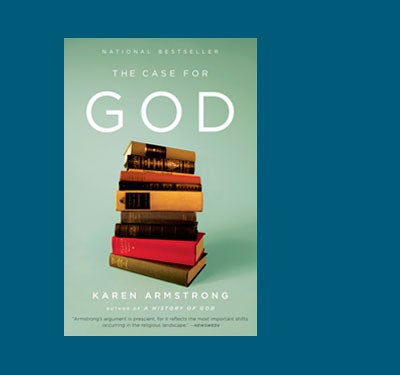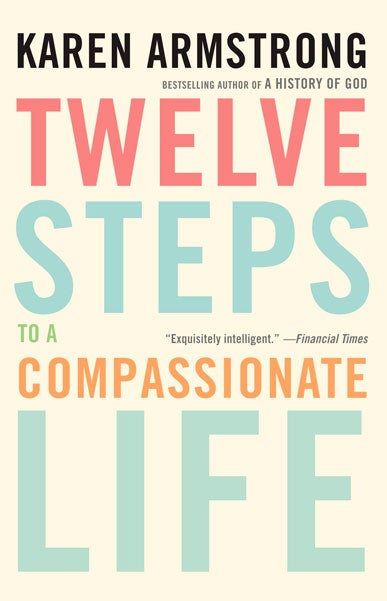The Acclaimed Bestseller

More about The Case for God:
• Praise• Read an Excerpt
• Reading Group Guide
Buy the trade paperback or ebook.
For Discussion
Karen Armstrong invites you to start a Twelve Steps to a Compassionate Life Reading Group in your community, school, or workplace. Click for a Reading Group Guide, including a personal note from the author, tips for starting the group, discussion questions, sample promotional material, and more, or visit www.CharterForCompassion.org/Learn/ReadingGroups
An Excerpt from the Guide:
Empathy
Discussion Questions
1. Commenting on the futility of the Buddha’s father’s attempt to shield him from suffering, Armstrong writes, “As long as we close our minds to the pain that presses in upon us on all sides, we remain imprisoned in delusion, because this artificial existence bears no relation to reality” (p. 91). What defenses do you use to shield yourself from suffering? Do these defenses help or hinder your capacity for compassion?
2. “Art calls us to recognize our pain and aspirations and to open our minds to others. Art helps us—as it helped the Greeks—to realize that we are not alone; everybody else is suffering” (p. 98). Discuss a piece of art, a performance, book, or movie that has helped you develop empathy toward others.
3. Armstrong shares the story of Patty Anglin who “always claimed that the misery she experienced in a harsh boarding school, where she had learning difficulties, prepared her for her life’s work” (p. 101) caring for children abandoned by their parents. Was your choice of an avocation or vocation influenced by difficulties you experienced? Share your story.
Actions
1. Spend a day “tuning into” how people around you are feeling.
2. It is often difficult to witness suffering and to engage with someone in distress, especially when we are preoccupied with our own concerns. Notice, over the next month, when you want to turn away. Instead, remember how it feels to be hurt, depressed, angry, helpless, and distraught. Then remember what it was like to have someone be kind and caring toward you. Offer that person a kind gesture (pp. 101–102).
3. Follow the instructions on page 102 to add three more stages to the meditation on the “immeasurable minds of love.”
An Excerpt from the Guide:
Empathy
Discussion Questions
1. Commenting on the futility of the Buddha’s father’s attempt to shield him from suffering, Armstrong writes, “As long as we close our minds to the pain that presses in upon us on all sides, we remain imprisoned in delusion, because this artificial existence bears no relation to reality” (p. 91). What defenses do you use to shield yourself from suffering? Do these defenses help or hinder your capacity for compassion?
2. “Art calls us to recognize our pain and aspirations and to open our minds to others. Art helps us—as it helped the Greeks—to realize that we are not alone; everybody else is suffering” (p. 98). Discuss a piece of art, a performance, book, or movie that has helped you develop empathy toward others.
3. Armstrong shares the story of Patty Anglin who “always claimed that the misery she experienced in a harsh boarding school, where she had learning difficulties, prepared her for her life’s work” (p. 101) caring for children abandoned by their parents. Was your choice of an avocation or vocation influenced by difficulties you experienced? Share your story.
Actions
1. Spend a day “tuning into” how people around you are feeling.
2. It is often difficult to witness suffering and to engage with someone in distress, especially when we are preoccupied with our own concerns. Notice, over the next month, when you want to turn away. Instead, remember how it feels to be hurt, depressed, angry, helpless, and distraught. Then remember what it was like to have someone be kind and caring toward you. Offer that person a kind gesture (pp. 101–102).
3. Follow the instructions on page 102 to add three more stages to the meditation on the “immeasurable minds of love.”














